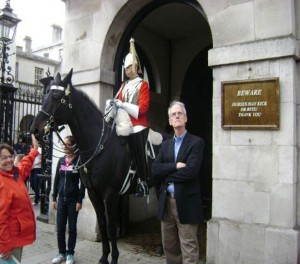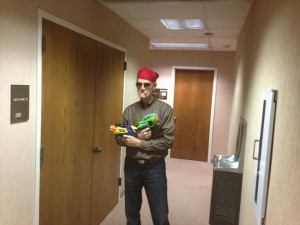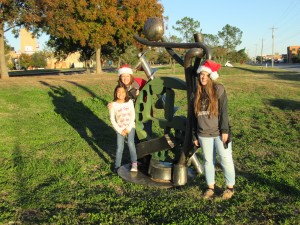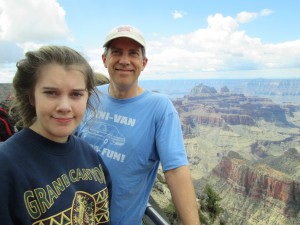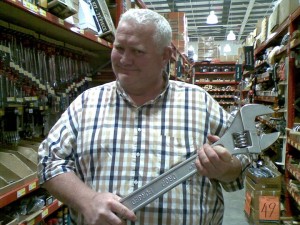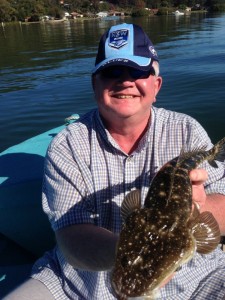by M. C. Jennings | May 6, 2016 | Academics, COBA Events, COBA Faculty, COBA Staff, Current Students, Dean Chronicles, Uncategorized
COBA is excited to announce that Dr. Brad Crisp has been named as the new Dean for the College of Business Administration.
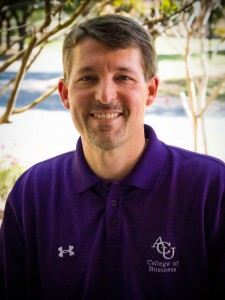
Dr. Brad Crisp
In a statement from the Provost’s office, Dr. Robert Rhodes said, “Based on the recommendation of the search committee, I am pleased to announce the appointment of Dr. Brad Crisp as the Dean of the College of Business Administration effective May 9, 2016.
During his 10 years on the faculty at ACU, Dr. Crisp has served as director of the School of Information Technology and Computing, which earned ABET accreditation under his leadership; and he launched the online Master of Business Administration as its first director.

I am confident in his ability to lead the College of Business Administration. He is committed to supporting faculty and to preparing students well through his continued commitment to academic excellence and his sharp focus on intentional Christian spiritual formation.
Dr. Crisp is a 1993 COBA graduate and holds an MBA and a Ph.D from the University of Texas. Brad is married to Jennifer, and they have two sons, Jon and Caleb.”
Please join us in congratulating Dr. Crisp as he begins his tenure as Dean.
by M. C. Jennings | Apr 26, 2016 | Uncategorized
What is your educational background?
B.S. in mathematics from Oklahoma Christian University, Masters of Engineering and Ph.D. in Industrial Engineering from Texas A&M University.
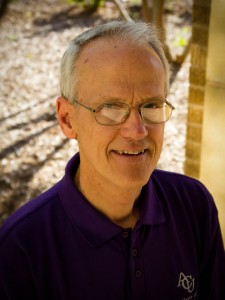
Dr. Don Pope
What is your work background?
I worked 20 years in the aircraft industry with Lockheed in Fort Worth and Northrop Grumman/Vought Aircraft in Dallas. My specific job was in the planning, analysis, simulation modeling and economic justification of technology modernization projects for the factory.
What do you teach at ACU?
I teach, or have taught the following: statistics, management science, quality management, logistics & supply chain management, operations management, project management, and enterprise resources planning systems (SAP).
What committees/other duties do you have at ACU aside from teaching?
I currently serve on the university faculty athletics committee which functions as a bridge between the faculty and the athletics department. In the college, I serve a role working with assessment and accreditation issues.
What drew you to teaching? Why did you want to work with students?
After working in the aircraft industry for 20 years, I felt that teaching at a Christian university was an opportunity to utilize and apply my academic training, on-the-job real world lessons learned, and my Christian faith mission. Professors were important in my own life, and I feel that I can play an important role in the lives of students.
What’s the best part of working with students?
The best part of working with students is that you can get to know them as people, pray for them, and help shape their values for eternity.
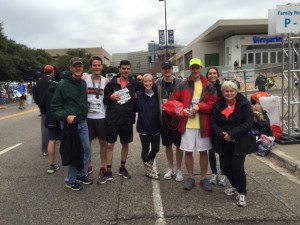
The Pope Family
Have you ever given up any big opportunities to keep working with students?
I left a great job/career/future retirement, but it was worth it.
Outside of teaching, what passions and hobbies do you have?
My hobbies and interests include walking, home renovations (within a limited supply of time and funds), and disc golf.
What is a good, early story about your teaching?
I remember, that first year, making a passing reference to the Vietnam War. (The Vietnam War had been a defining event in my generation’s college years.) When I received a bunch of blank stares at the mention of this seemingly important historical event, I did the mental math about the student’s ages and year of birth, and then realized that I had been talking “ancient history” and not “current events” to them.
Tell me about a project or accomplishment that you consider to be the most significant in your career.
I had a role in the implementation of large, complex systems in my company in the aircraft industry. At ACU, I have played a role in the introduction of technology and related course options for business students, including hands-on use of the SAP software.
Do you do any charity or non-profit work?
Besides church related activities such as teaching and serving as an elder, my wife Beth and I have been weekly Meals on Wheels drivers for about 15 years. This experience has been my connection to the reality that defines the lives of a large portion of our society.
Who is your role model, and why?
That is a hard question. As the youngest child in my family, I always looked up to my parents and my siblings and admired their character. My wife is a role model of selfless giving energy for others. I tend to admire no-nonsense personalities who speak simply and plainly, who are quietly serving and not tooting their own horn or trying to impress someone. I try to emulate that in my own life.
Who was your most inspirational professor and why?
That is another difficult question. I suppose that it was Dr. Robert McMillan, mathematics professor at Oklahoma Christian University, and Dr. Bailey McBride, English professor and Provost, also at OCU. They were great teachers, caring people, and devoted Christians and important influences during my undergrad years.
If you could have a superpower, what would it be and why?
That is another hard question. You always wish you had the power to make sick children well, to make the elderly comfortable, to make people stop fighting, etc.
What is something that students might be surprised to find out about you?
No real surprises. I am, at heart, a rather plain guy. What you see is what you get.
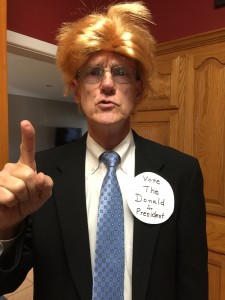
Donald for President. He’s the Prankster in Chief in COBA!
What would you really want students and alums to know about you?
That I really care about them and the kind of person that they are becoming. I pray that they will be people of the 5Cs: character, courage, compassion, clarity, and callouses (from working hands).
by M. C. Jennings | Apr 21, 2016 | Academics, Careers In..., COBA Faculty, Current Students, Human Resource Management, Uncategorized
Field trips aren’t just for elementary school students. Many professors find taking students on field trips gives them insight on careers and industries they may have never known about, as well as building networking opportunities for students and employers at the sites that they visit. On Wednesday, March 30th, Dr. Malcolm Coco took 7 of COBA’s Human Resources track students on a field trip to the TSTC campus in Sweetwater, Texas. Their guide for the day was Hannah Love, Associate Vice Chancellor for Human Resources. Ms. Love has responsibility for the HR function for eleven of the TSTC campuses located across Texas. She presented to the students on the functions of HR and the challenges faced by having so many different campuses located in eleven different geographic locations. She also discussed the challenges TSTC faces in providing training programs for businesses across the state of Texas tailored for their individual company needs. The group enjoyed a tour of TSTC’s wind turbine and electromagnetic systems technology training facility.
Following the presentation and tour, Dr. Coco and the students were treated to lunch with the TSTC staff. Dr. Coco said, “This was a very informative trip and the interaction with the students was outstanding. Too many times, students are unable to connect textbook learning with a real world application. Having the students personally hear from professionals in their field really adds a new and current perspective to the subjects we are studying. I have found that HR professionals are more than willing to share their time and expertise with students and that is greatly appreciated. TSTC is no exception. The other added bonus is that field trips help to establish networks that foster job and internship opportunities.”
Judith Morales, senior management major from Fort Worth, Texas, said, “We spoke with the HR manager and she talked to us about the experiences she has had and how they benefited her in her career. One of my favorite parts of the trip was socializing with the other students in my major and getting to know them, as well as getting to know Dr. Coco, a little better.”
We’re grateful to TSTC for their hospitality and to Dr. Coco for getting the students out of the classroom and into the working world. Opportunities like this enable our students to grow and develop as well as connect with potential employers as they pursue their career goals.
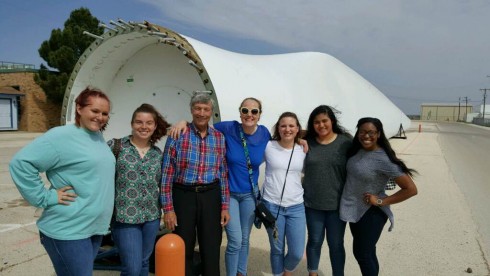
Dr. Coco with students: Judith Morales, Abbie Hamilton, Sarah Stone, Allison Barton, and Kee Ana Ward
by M. C. Jennings | Apr 19, 2016 | Uncategorized
What is your educational background?
B.S from Harding University (’83)
D.C. from Parker University (’06)
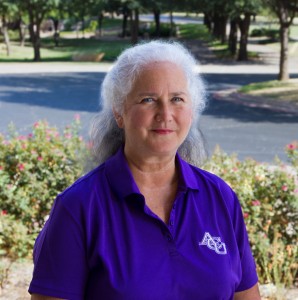
What is your work background?
I spent a good portion of the 80’s working with my husband, Jon, in both Caracas and Valencia, Venezuela, planting and growing churches.
From 1990 till 2003, I taught school at the elementary level and raised 4 children.
From 2007 til 2015, I practiced as a chiropractic physician in Tulsa, OK.
What do you do at ACU/COBA?
I work with the professors and leadership of COBA to plan, organize and manage the travel programs of COBA, Leadership Summit and Study Abroad.
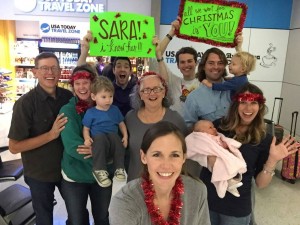
The Steffins Family
What drew you to work at ACU? Why did you want to work with students?
Three of my four children have, or are, attending ACU and have been blessed tremendously. I wanted to be a part of that blessing for other students.
What’s the best part of working with students?
I love new beginnings and that’s where students are…. on the threshold of a new beginning, a fresh start to the next chapter of their lives. Having an opportunity to plant seeds for a positive, healthy mindset in a student is fulfilling for me. My “office” is in the waiting area of COBA Connections and that allows me lots of chances to visit with students as they wait to see their academic advisors. I truly enjoy asking questions and listening to their perspectives.
Outside of ACU, what passions and hobbies do you have?
My newest passions are my four grandbabies!
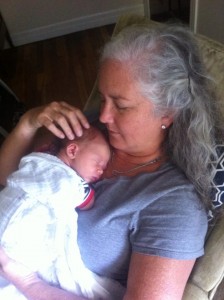
Do you do any charity or non-profit work?
Our family has supported a child in the Dominican Republic for the last 8 years though Compassion International.
Who is your role model and why?
My role models are 3 entrepreneurial women that I’ve met through business connections over the last 5 years. They are strong, confident leaders who are willing to give their time to mentor me.
Who was your most inspirational professor and why?
Neil Pryor was most inspirational to me not only because of the way he taught Bible but also because of how he valued people.
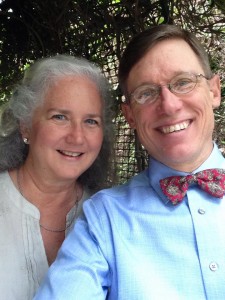
Cheryl and Jon Steffins
If you could have a superpower, what would it be and why?
It would be the power to discern clearly whether someone is speaking truth or falsehood.
What is something that students might be surprised to find out about you?
Some are surprised when they learn that I speak Spanish.
by M. C. Jennings | Apr 14, 2016 | Uncategorized
The Springboard Ideas Challenge, sponsored by ACU’s Griggs Center for Entrepreneurship and Philanthropy, has undergone a restructuring for the upcoming competitions.
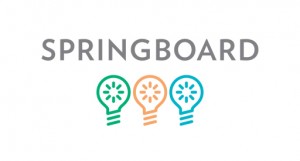
According to a recent ACU press release, Springboard, which launched in 2007, was created to allow local college students and members of the community a chance to pitch their ideas to local investors and possibly walk away with thousands of dollars in startup funding and other resources. Over the last nine years, the competition has awarded more than $400,000 in winnings to aspiring entrepreneurs.
For 2016, the program will make significant changes to the overall process.
“One of the biggest changes has been moving from a business plan to a business model competition,” Karen Heflin, Springboard program coordinator, said. “A business plan, which is what we’ve required in the past, is a lengthy report. A business model is more of a storyboard presentation with initial research done by participants. It gives aspiring entrepreneurs valuable information before they ever launch their business, helping them be more successful.”
In 2016, the Springboard Ideas Challenge made it easier for entrepreneurs across the Big Country to compete. These first round elevator pitch events for the Springboard Ideas Challenge-Community Division were hosted in Sweetwater, Brownwood/Early, Haskell, Abilene and Snyder, partnering with the Chambers of Commerce in each location to host the event. Participants presented a two-minute elevator pitch instead of submitting a plan or written application. Training and mentors were made available to teams that advanced past the first round of the competition. These resources help to prepare contestants to take their initial idea, and transform it into a working and applicable business model that investors would be interested in.
From those five first rounds, 15 teams advanced to the next round. They attended a business model training workshop at ACU on February 28th and are currently in the process of researching and preparing their business model.
They will present to another panel of live judges on Tuesday, May 10th. The competition will end in May with the top three teams presenting their final business model to a group of local investors for a chance to win $15,000. The top three teams will be chosen and will advance to the final round. The final round will be held at the Investors Lunch on Tuesday, May 24th at the Abilene Civic Center, from 11:45am-1:00pm. The teams will present their business models at the luncheon and a panel of local angel investors will determine the Grand P$2rize winner as well as the 2nd and 3rd place winners. Prizes to be awarded are: Grand Prize: $15,000, 2nd Place: $2,500, and 3rd Place: $2,500. Guests at the luncheon will include members from the area Chambers of Commerce, Economic Development Centers, Small Business Development Centers, and the Springboard Regional Entrepreneur Network.
The Springboard Ideas Challenge-ACU Division participants attended a business model training in early February, researched and then submitted a video presentation of their business model canvas on April 8th. The top teams presented their ideas to a live judging panel on April 14th. Winners will be announced at the Entrepreneur Fellows Program Lunch on April 20th in the Hunter Welcome Center.
For more information, visit acu.edu/springboard, call Karen Heflin at 325-674-6485 or email griggscenter@acu.edu.
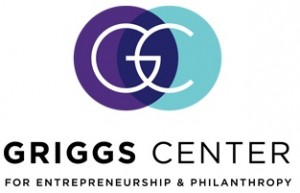
by M. C. Jennings | Apr 12, 2016 | Uncategorized
What is your educational background?
PhD in Finance (Texas A&M University, 2012)
Master of International Business Studies (University of South Carolina, 1997)
Bachelor of Arts in International Studies (ACU, 1991)
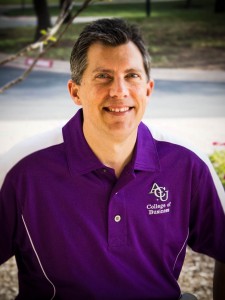
Dr. Kyle Tippens
What is your work background?
Before getting my PhD, I worked for 13 years in various finance-related jobs at Dell, EDS (now part of HP), Swiss Bank Corporation–Germany (now part of UBS Germany), and Agency Management Services (now Vertafore). For these jobs we have lived in Round Rock, Plano, and College Station, Texas; Wellington, New Zealand; Frankfurt, Germany; and Rochester, New York. My wife can fill you in on the details and number of all our moves. (I need an emoticon here.)
What do you teach at ACU?
I usually teach courses in Personal Financial Planning (open to students of all majors) as well as Investments (usually for financial management or accounting majors). I have also taught a course in International Finance for study abroad, and I recently co-taught a graduate course called “Biblical Perspectives on Stewardship.”
What committees/other duties do you have at ACU aside from teaching?
I am on two research committees, one for COBA and one for ACU. I also try to visit with prospective students and answer their questions about COBA and ACU when they visit campus. Throughout the semesters and during the summer I try to carve out some time to move my research along. Finally, one of my favorite roles is helping coordinate “ACUFIFA,” which is a group of faculty, staff, and students who play football (i.e., soccer) twice a week. We often field one or two intramural teams each semester as well.
What drew you to teaching? Why did you want to work with students?
Teaching is in the blood in my family: my great-grandfather, grandfather, and father have all taught students in secondary or higher education. Initially I had no plans to follow in their footsteps and pursued a career in business. Over time, however, my desire to do deeper research and to help students understand more about business, finance in particular, led me to follow a call to further education and a career in teaching and research. A handful of mentors in my life (including former COBA Dean Rick Lytle) also encouraged me to make that decision.
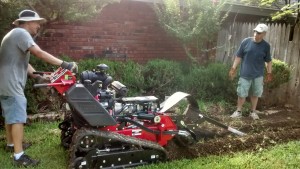
Kyle working with his dad, Dr. Darryl Tippens on a non-scholastic project
What’s the best part of working with students?
Working with students means that no two days are ever the same. I love to learn, and as any teacher knows, there is no better way to learn than to teach. I learn from students as well. When students are open to it, I really appreciate the discussions and relationships that can form among us inside and outside of the classroom as we seek to learn and grow.
Have you ever given up any big opportunities to keep working with students?
My biggest (and my family’s biggest) sacrifice came in the middle of my finance career when I quit a good job with Dell in 2007, we sold our house, and we moved to College Station in order for me to embark on a five-year PhD degree with little income. It was a tough experience on all of us, and more than once I had second thoughts about the plan.
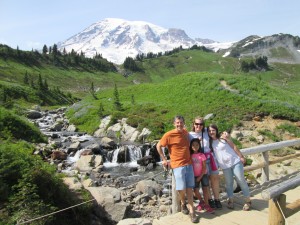
The Tippens Family
Outside of teaching, what passions and hobbies do you have?
I spend a lot of time with my family. My wife and I have two daughters, a 15-year-old and an 8-year-old. My parents now live in Abilene also, and we often try to visit with my in-laws from Corpus Christi, Texas. Our family loves to travel, both domestically and internationally, and we sometimes go camping. Our church life is important to us as well.
I like to play soccer (both indoor and outdoor); I’m currently on the “Ten Plagues” intramural team. In the past I also enjoyed racquetball and squash. I enjoy going to concerts of many different kinds, but I don’t go as often as I’d like.
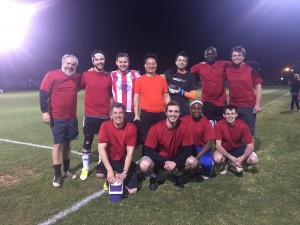
What is a good, early story about your teaching?
I was blessed to hear back from a student I had in my very first semester at ACU. He took my Personal Financial Planning class, then graduated and moved to another state for his first full-time job. He wrote me back a couple of months later and told me how specific topics and assignments had been a blessing to him in his new career. I always appreciate hearing back from students.
Tell me about a project or accomplishment that you consider to be the most significant in your career.
Although you may mean my current career, I am going to reach back to a career I had much longer than this one. There is something about a shared, difficult experience that bonds people together. When I worked for EDS in New Zealand, I was on a project team that was bidding on a 10-year, $800 million contract to manage Telecom NZ’s information technology infrastructure. I was on the finance team that was running all the numbers, putting all the pieces together and rolling it into the high-level proposal. We were on conference calls at weird hours of the night with senior management (due to time zone differences) and often stayed very late other nights. It was the most intense work I have ever done, but it was also great to work with a team like that. EDS won the contract and I was able to stick around for a few more months as the deal became reality. Although I would not be physically and emotionally able to work like that for long periods of time, it was an incredible, fun, and satisfying experience.
Do you do any charity or non-profit work?
I am the treasurer for our widows’ and widowers’ ministry at church, and I am on the stewardship team (elsewhere known as the “budget committee”). My wife and I lead middle school small groups on Sundays. This summer the whole family will be volunteering for a few days at Best Friends Animal Society in Utah. (I confess that I am the least excited of the group.)
Who is your role model, and why?
While I want to be Christ-like more than anything else, I have a composite role model: I want to emulate certain things about some very important people in my life.
Who was your most inspirational professor and why?
Two in particular come to mind. I had Physics with Mr. Steve Mathis my senior year in high school in Edmond, Oklahoma. He made the subject so incredibly fun and interesting that I came to ACU as an Engineering Physics major. (I later changed majors after getting tired of studying electrons.) He was extremely knowledgeable and demanding but at the same time was very humble and likeable. It probably helped that I was (and am) in complete awe of the power of physics as a discipline.
The next year as a freshman at ACU, I had Dr. Tony Ash for “Life and Teachings of Jesus.” I had never experienced the gospels in the way that he taught them. I found it exhilarating. He also spent a lot of time going through information about each student at the beginning of each class. He did his best to find some special connection with each student: “I had your aunt in class.” “I used to preach in Podunk, Texas. Did you know Betty Wilson there?” That was amazing also.
If you could have a superpower, what would it be and why?
The kind of answer I might have come up with as a 12-year-old still seems appealing: I’d like the power to be able to switch superpowers at will. Maybe I’d like to be able to fly today, but tomorrow I might want to be invisible. The day after that I might want to be able to keep everyone in a warm room just after lunch from falling asleep. (Purely hypothetical, of course!)
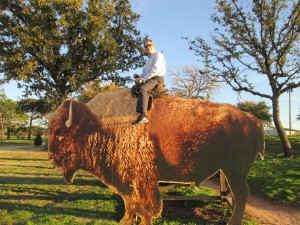
What is something that students might be surprised to find out about you?
I really enjoyed playing the tuba in high school and college. I was in All-State Band and All-State Orchestra in high school, and I was in the Big Purple and the Abilene Intercollegiate Orchestra in college. One of these days I wouldn’t mind getting back into it, if I can find the time.
What would you really want students and alums to know about you?
Although ACU is much different today than when I chose to come here as a student in 1987, I still appreciate ACU and what it stands for. I love working with the students here and I have never enjoyed working with colleagues more than I do here.
by M. C. Jennings | Apr 7, 2016 | Academics, COBA Events, COBA Faculty, COBA Staff, College Decisions, Current Students, Faith Infusion, Uncategorized
On Tuesday, March 29th, generous donors and scholarship recipients enjoyed a luncheon in memory of Ruth Allen Griggs. Ruth’s children, Jack Griggs and Ann Griggs Berger, along with their respective spouses Ann Griggs and the late Bob Berger, established an endowment in 2015 to honor their mother and her spirit of generosity by having a yearly luncheon bringing together COBA donors and students. The goal for the endowment is to honor and thank donors for the scholarships given to the College of Business that allow so many students to attend ACU and to participate in many of the experiential learning opportunities that COBA offers.
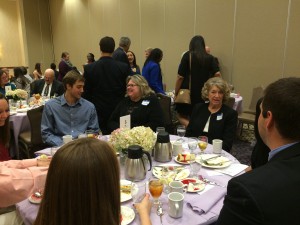
COBA students Bailey Thomas, senior marketing major from Lubbock, and Jack Oduro, junior accounting major from Garland, spoke to the audience about what receiving COBA scholarships has meant to them and the impact that it has had on their education and experiences at ACU. Jack said, “A relationship with a donor is usually one with some distance; however, it was humbling to be in deeper conversations with the men and women who have sacrificed time, money and energy in making my experience at COBA great. It (the luncheon) was one of the most effective avenues to allow donors to meet who their resources are developing and to give students the opportunity to express our profound appreciation. ”
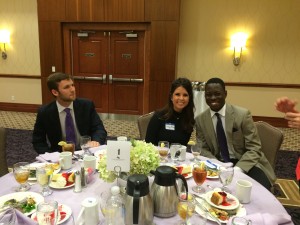
Don Crisp, accounting alumnus (class of 1964) from Dallas, spoke about he and his wife, Carol’s experiences as young college students at then Abilene Christian College. Mr. Crisp encouraged donors to continue to pour into the lives of students at ACU and exhorted current students to give back to students in the future.
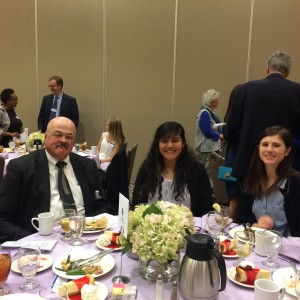
Dr. Brad Crisp, interim Dean for the College of Business, said “COBA’s donors make so many things possible. Their generosity eases the burden of tuition on our students and enables us to constantly innovate in our goal to consistently provide high quality educational experiences. We’re so thankful for their support and giving spirit.”
by M. C. Jennings | Apr 5, 2016 | Academics, COBA Faculty, Mobile Learning, Research, Uncategorized
What is your educational background?
DA, Middle Tennessee State Univ, 1998.
Major: Economics
MBA, Belmont University, 1989.
Major: Business Administration
BBus, University of Western Sydney, 1987
Major: Marketing
Mcert, Blacktown Technical College, 1982
Mitchell High School, Blacktown, N.S.W. Australia, 1975
(All my degrees after high school were done part time while working full time.)
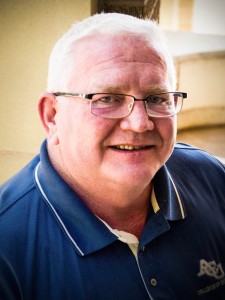
Dr. Ian Shepherd
What is your work background?
Partner, One Pulse. (May 2010 – Present).
Vice President of Operations, Gradeslayer Inc. (October 2005 – Present).
Professor Management Sciences, Abilene Christian University. (2003 – Present).
Associate Professor and Department Chair, Harris College of Business, Faulkner University. (2002 – 2003).
Vice President, Aussie Delivery Services. (July 2006 – Present).
Director of Finance, New Horizons. (June 2007 – May 2009).
Assistant Vice President, Logistics Systems, INGRAM BOOK GROUP. (2001 – 2002).
Assistant Vice President, Consumer Direct Fulfillment, INGRAM FULFILLMENT SERVICES. (1996 – 2001).
Director of Purchasing Operations, INGRAM BOOK COMPANY. (1991 – 1996).
Marketing Research Manager, Dollar General Corporation. (1987 – 1988).
Materials Controller, Alcan Australia Limited. (1978 – 1987).
Inspectors Clerk, New South Wales Police Department. (1976 – 1978).
Hole digger, Metropolitan Water Sewage and Drainage Board (1975)
What do you teach at ACU?
Undergraduate:
• Macroeconomics
• Microeconomics
• Managerial Economics
• International Business
• Operations
Graduate:
• Leadership
• Economics Boot Camp
• Organizational Behavior
• Human Resource Management
What committees/other duties do you have at ACU aside from teaching?
UGEC
What drew you to teaching? Why did you want to work with students?
I have always wanted to teach at the college level. I just had to get ready to do so.
What’s the best part of working with students?
Seeing that look when someone really gets what you are talking about.
Have you ever given up any big opportunities to keep working with students?
50% pay cut to teach.
Lived away from my family for a year to make the teaching profession happen.
Outside of teaching, what passions and hobbies do you have?
Home projects and fishing.
What is a good, early story about your teaching?
I try to use life experiences to get the importance of economic topics across to students. Here is one of my favorite class moments….
The work bag lesson!
It sits in my office.
It sits on my desk in plain view.
Sometimes it goes unnoticed.
Usually no one asks about it.
Today, however, its story was told to my 9:30 am Macroeconomics class. I would be talking about the value of work and how work changes the legacy of your family. I had no better example than what sat at the front of our class. For the entire class my dad’s work bag sat in front of my 100 students. Each student sat there wondering what was going on. I was about to tell them.
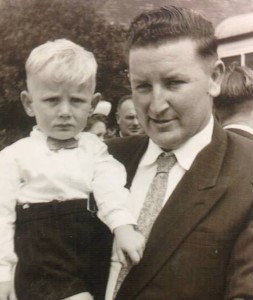
Ian and his father, Cliff Shepherd
Cliffy (Cliff Shepherd for those who did not know him) grew up in Kurrajong at the base of the Blue Mountains west of Sydney. A boy from the bush. He won awards for farming at the county and state shows and can be seen in the attached picture with a serious crop of corn almost 12 feet high. Growing up, dad only finished through the 8th grade. He was a good worker. He worked hard on his dad’s (Cecil’s) farm. I guess he would have stayed farming had he not met the young pretty girl Audrey at a church function. At first Auds (Audrey) did not like dad. She told us she threw stones at him to get him to go away. But as you all know, hate is love in disguise. The boy from the bush and the girl from Granville “Lell in Fove” and were married on New Year’s Eve 1955.
After completing his national service and marrying mum dad was offered a job at Alcan Australia Limited in Granville. It was nowhere near the bush and so different than anything dad had ever experienced. I would be lying if I didn’t tell you that it was mum’s father, Jim Byrnes (a manager at Alcan) that got dad the job. I guess he was looking out for his daughter, Audrey. The job was not a fancy job. It was a case maker. You nailed together boxes to ship the aluminium (yes that spelling is intentional my American friends) sheets, coil, or extrusions. It was (at this time) 6 days a week (5 full days and half day on Saturday).
My first memories of dad as a child were of waking very early on Saturday mornings. Other families would sleep in and enjoy the day, but not ours. At 5:30 am I would here rustling around in the kitchen. It was methodical. The fridge door would open. You would hear items being fumbled and stacked on the table in the darkness. You would then hear items being returned to the fridge. All the time dad would try to be quiet but not quite pull it off. Things would be dropped. Messes would be made. Noises were inevitable. Then you would hear the sandwich, fruit, and drink being placed in the squeaky work bag in preparation for the 6th work day of the week.
I would lay in bed complaining in my head about why this man was keeping me awake! Then I would hear the bag. He would picked it up and as he carried it out the door on the way to work its handle would squeak as it rocked back and forth with each step. Why! I would ask myself. Its 5:30 am when normal people were sleeping. It took fifty or so years for me to grasp what was going on. Each squeak of that handle on each of those 5:30 am mornings was teaching me a lesson. You do what you need to do to take care of your family.
This man, with an eight grade education would go through this routine every day of the week, except for Sundays, for most of his life. I never heard him complain about it. He just did it.
Over the next 45 to 50 years, that young bush boy got out of bed and took that lunch bag to his job. At first he hammered nails. He was good at it. He was also the kind of guy that people liked to be around so dad worked well with people. I can remember when they made him foreman and gave him his own shift to run. I remember when they made him warehouse supervisor in charge of inventory location and movement. I remember when they moved him to work in transportation. Finally, dad was running the warehouse, distribution and transportation nationally for Alcan. Each day, the same thing. Get up, go through the bag loading ritual, work hard, and care for your family. It did not matter that dad had only an eighth grade education. Having little education does not mean you’re stupid. Having no drive to care for your family is stupid, he would tell me. Dad always did what he said he would do. He had promised to care for his family, and for 45 or more years he did that every day without complaint.
When dad retired due to poor health, the bag was stored in the tool shed. It lay there for years gathering dust. I found it two years ago while cleaning out the shed and when Sue (my sister) asked if we should toss it I said no…! It meant too much to me. That day, the enormity of those 45 years of squeaky handle noises struck home.
As kids, we never wanted for anything. We were poor, but we were not in need. We went without, but we were never hungry. We had no TV, flush toilet, or carpet on the floor, but we laughed and loved. We had sheets for curtains and no heat in the house and yet it was a warm place for our family to gather. We played cricket down the driveway with the neighborhood kids and we drove old hand me down Holdens (Chevrolets).
When I look back now I can see his plan. You live your life to make the next generation’s legacy a better legacy than the one you were given. To do that, you have to work hard and be a consistent example to that next generation. The goal is to make things better. If that means hammering nails at 6 am on Saturday, then that is what I will do to make life better for my kids.
That boy from the bush raise three kids and loved his wife. Between them the three children have 8 degrees, the lowest of which is a master’s degree and one a doctorate. They are teachers, executives, and government servants, all with their own homes and families. Not a bad effort on Cliffy’s part if you ask me. Not bad at all.
So the boy from the bush who couldn’t rub two pennies together when he met mum had his story told in class today. As I sit here writing this tome after teaching that class I wonder if the students got the importance of what I was telling them. I can tell you what I got out of that class…..? I suddenly had the desire to be woken up at 5:30 am on a cold Saturday morning as that squeaky bag handle rattles its way to the back door for the ten thousandth time, but this time I get out of bed and I hug the man who made me who I am, and I thank him for what he did to make my life as easy as it is today. Good one Cliffy…good one…!
So what can we learn from this experience?
1. You sometimes don’t know what you’ve got until it’s gone.
2. Persistence makes perfect! Well, at least it teaches us to keep going.
3. What dad worked for took many decades to come to fruition. A good lesson for the “I want it now” generation in patience.
4. Do what you say you will do!
5. You will miss those annoying traits of your loved ones once they are gone.
6. You can’t make Devon (bologna) and sauce sandwiches quietly in the dark.
7. The rustle of a re-used bread bag to wrap a sandwich can frustrate small children.
8. I’d say “oil that handle,” but then I probably would not have had this story to tell.
Tell me about a project or accomplishment that you consider to be the most significant in your career.
The iPad initiative. Interview with CNBC on national television.
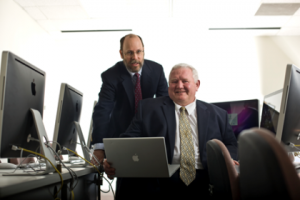
Brent Reeves and Ian Shepherd
Do you do any charity or non-profit work?
No, just regular church work.
Who is your role model, and why?
I have had two great men who have influenced me. The first is, my father, who taught me about life and the church and led by example. The second, my father-in-law who modeled continuing education and study to me.
Who was your most inspirational professor and why?
Most influential was a high school teacher at Mitchell High School in Blacktown in Australia. He taught business and commerce. His name was Max Wilson. He believed in me and made me feel like I could be successful at anything I put my mind to!
If you could have a superpower, what would it be and why?
Invisibility – so I can sleep all day and no one could find me.
What is something that students might be surprised to find out about you?
I slept with my current wife for 6 weeks prior to our wedding in Australia. Of course, I married her twice. Once in Stephenville TX for her side of the family. Then six weeks later for my side of the family in Australia. So, I have been married twice. To the same woman.
We have had three children, but only two are living now.
I played rugby and cricket in Australia.
I also played defensive lineman for the Argonauts in the Australian American Football League in Sydney, Australia.
I have written a humorous book of life stories entitled: “Life Lessons: A roadmap to surviving life’s twists and turns.” Available from Amazon.
-
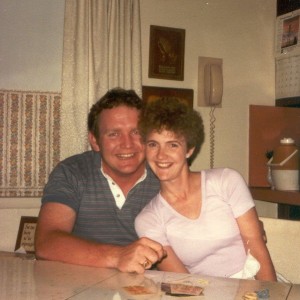
-
Ian and Dee Ann
-
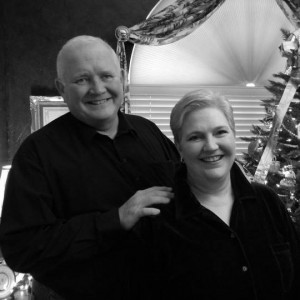
-
Ian and Dee Ann
What would you really want students and alums to know about you?
Born in Sydney in 1956 to Cliff and Audrey Shepherd, Ian spent the first six years of his life living in Granville, a working class suburb of Sydney, with his parents and grandparents. These formative years were spent mostly under the tutelage of his grandmother who provided day care while the rest of the family worked hard to get their own home built. Some of the early stories of his life date to this period and give an interesting insight into the mind of an active young Aussie with time on his hands.
In 1962 the family moved to their new home in Blacktown, a small outer rim suburb of Sydney that had just begun development. The author spent the next twenty-five years in this area completing high school and finalizing a degree in Marketing from the University of Western Sydney (Nepean). It was during these years that the importance of family and church were imprinted on his impressionable mind.
In 1979 Ian married a lifelong friend, Dee Ann Roper a missionary’s daughter, and took up residence in Marayong, a suburb of Sydney. After living and working in the area for nine years they made plans to further their education in America. In 1987 Ian and Dee Ann moved to Nashville Tennessee where they both entered school, Ian to complete his M.B.A. and Dee Ann to complete her Bachelor of Science degree in Music Education. It was during this time that Tabitha (1988), James (1990 deceased) and Ethan (1991) their children were born.
Ian spent many years working in industry in both Australia and the United States. In all his experience he was noted as having a unique sense of humor regarding the workplace and his home life. “After all,” Ian would say, “If I can’t laugh at the silly and stupid things I have done, my life would be pretty boring?” He is also known to tell a good story around the campfire.
After completing his M.B.A. Ian continued his education while working and in 1998 completed a Doctor of Arts degree in Economics from Middle Tennessee State University in Murfreesboro, Tennessee. In July of 2003, Ian moved to Abilene Texas where he is now a Tenured Professor in Economics and teaching online and in the new MBA program.
Ian calls himself a “humorist”, trying to see the funny side of all the events that befall us in life. His stories and humor reflect on the everyday man and his ability to find joy in the simplest of things, mainly his own stupidity.
Ian has lived in the USA for 29 years, but only this year did he become a US citizen. He waited to do so because of his mum (who passed away last year in Australia). His wife (Dee Ann) is a Senior CPA with Davis Kinard in Abilene Texas. Ian has two living children, Ethan Shepherd who graduated from ACU and is an HR Manager at Abilene Regional Hospital, and Tabitha Shepherd who graduated with her masters from the Boston Conservatory. Tabitha teaches in Oregon. Ian’s son, James died at birth.
Ian loves ACU and the environment in which the school molds young lives for Christian Business Service.
by M. C. Jennings | Mar 24, 2016 | Academics, Accounting, Careers In..., COBA Faculty, Faith Infusion, MAcc, Uncategorized
What is your education background?
Ph.D., University of Florida, 1990 – major in Accounting and minor in Finance
M.S., Abilene Christian University, 1984 – major in Religious Education
B.B.A., Abilene Christian University, 1980 – major in Accounting
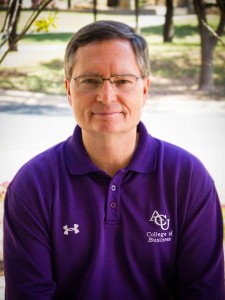
Dr. John Neill
What is your work background?
I began my career as a Programmer Analyst and Corporate Accountant with Pennzoil Company, working for them from 1980-1983. I spent a year as an Accounting Instructor for ACU from 1984-1985, moving from ACU to the University of Florida as a Research and Teaching Assistant from 1986-1990. I then began my work in academia, serving as an Assistant Professor at Florida State University from 1990-1997, as an Associate Professor at Chapman University from 1997-2000, and then moving to ACU where I began in 2000 as an Associate Professor. I now serve as the Chair of the Department of Accounting and Finance and am a Professor of Accounting.
What do you teach at ACU?
I teach Intermediate Accounting II and Advanced Accounting.
What committees/other duties do you have at ACU aside from teaching?
I am the Chair of the Accounting and Finance Department and the Director of the Master of Accountancy Program.
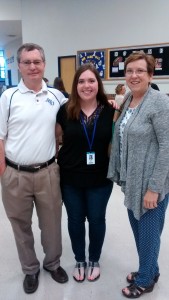
John, Natalie, and Karene Neill
What drew you to teaching? Why did you want to work with students?
In 1984 and 1985 I was working on a master’s degree in Bible at ACU. During that time, I was asked to teach one sophomore level accounting course per semester. I was surprised to learn how much I enjoyed that experience and it caused me to want to get a Ph.D. in accounting so I could continue to teach accounting at the university level.
What’s the best part of working with students?
I think the most rewarding aspect of teaching is that I get to see students grow up and mature over time.
Have you ever given up any big opportunities to keep working with students?
No, I have never considered doing anything else in the last 25 years.
Outside of teaching, what passions and hobbies do you have?
I am a graduate of the University of Florida, and I really enjoy watching Florida sporting events on TV. I also like to travel. In my younger days, I was an avid runner and I ran three marathons and a number of half marathons. I still enjoy exercising, but injuries have caused me to stop running.
Tell me about a project or accomplishment that you consider to be the most significant in your career.
I was invited to be a panelist at the Bentley University Global Business Ethics Symposium in Madrid, Spain in 2007. I also feel a sense of accomplishment every time one of my research papers is published.
Do you do any charity or non-profit work?
My wife and I deliver Meals on Wheels on Thursdays. We have had the same route for many years.
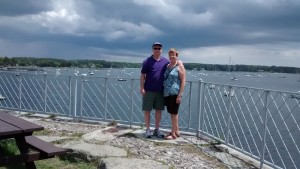
John and Karene Neill
Who is your role model and why?
I can’t think of a specific individual who I would consider my role model. However, I have great respect for anyone who takes pride in their work and lives their life with integrity.
Who was your most inspirational professor and why?
I have always had great respect for Dr. John Willis. When I was in his classes, I could tell how much he cared for his students. His mastery of the subject matter always impressed me also.
What is something that students might be surprised to find out about you?
I mentioned this earlier, but I think most of my current students would be surprised to know that I ran the Chicago (2002), Marine Corps (2003), and the New York City (2004) marathons. Sadly, age and injuries have now forced me to exercise on an elliptical while watching Netflix (I especially like BBC shows) on my iPad.
What would you really want students and alums to know about you?
I want students and alums to know how much I enjoy teaching at ACU. I believe in Christian education and in our mission in COBA.
by M. C. Jennings | Mar 10, 2016 | Academics, COBA Staff, College Decisions, Current Students, Faith Infusion, Uncategorized
What is your educational background?
I have a B.S. degree from Lubbock Christian College from back in the “dark ages”.
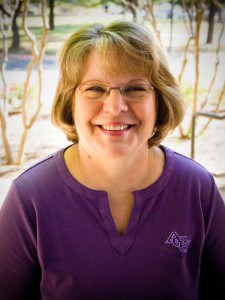
Karen Viertel
What is your work background?
I have been a business manager for a medical clinic, a school nurse/secretary, and an academic advisor. My most important work has been being a mom and now grandmother.
What do you do at ACU/COBA?
I am so privileged to serve as an academic advisor in COBA. I have been here for more than 10 years and I.LOVE.MY.JOB.
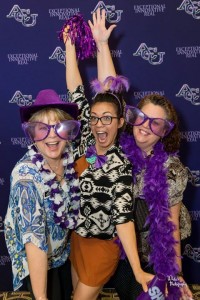
The three Amigos. Karen Viertel, Samantha Matta and Nuria Hall.
What drew you to work at ACU? Why did you want to work with students?
What drew me here was the opportunity to work with students every day. No two days are the same and it is NEVER boring. I love watching the life metamorphosis that happens between a student’s freshman year and graduation day. It’s truly remarkable to witness and I get to have a front-row seat for the whole show!! Most come to college scared and afraid and not sure at all about what they want to do after college. To watch them grow wings and be ready to fly off to a new job or adventure upon graduation, ready for the world is a pretty incredible feeling.
Outside of ACU, what passions and hobbies do you have?
My husband Mark and I operate a large family ranch north of Abilene. There we raise cattle and LOVE to build things: fences, houses, good memories. I enjoy “junkin’” and repurposing furniture, etc. I love a good flea market or junk store almost more than anything. My favorite thing to do is to be with my family. We have two grown children, both married and now two grandsons. At ages 3 years and 7 months, they are simply amazing. I can’t get enough of them.
What is a good, early story about your first job or when you were in college?
I remember landing my first job as a business manager for the only obstetrician in the small town we lived in, just prior to college graduation. I had NO IDEA what I was doing but he was patient and I worked hard to soak up everything I could while I was there. In the two years I worked for him, we made tremendous improvements in office efficiency and accuracy. Plus, I learned a lot about teamwork. Without the ability to be a team player, you severely restrict your effectiveness in any organization. Work chemistry is essential.
Do you do any charity or non-profit work?
Yes. Mark and I are very involved with Global Samaritan, Dry Bones in Denver and our church family. I also really love to help with Meals on Wheels.
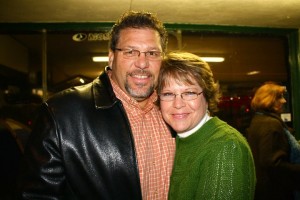
Mark and Karen Viertel
Who is your role model and why?
My grandmother has always been my role model, but now I would also add my mom. Granny was a very strong woman that raised two children, one of which became my equally strong mother. My mom became a widow at 28 and managed to raise myself and two sisters with the help of her widowed mother. I look back now and wonder how they did it. My mom was a rancher/farmer. She drove a tractor, plowed fields and pulled calves – not the type of work any other mothers at the time did. They both showed us that being a strong woman is a good thing. As a result, I’ve always been pretty much of a tomboy and am very at-home with outdoorsy ranching pursuits and I don’t shy away from hard, manual labor. In fact, I like it. It’s good for the soul.
Who was your most inspirational professor and why?
I would list two teachers: Dr. Gary Evans at LCC. He was my first college Bible teacher and he will never know the impact he had on my life and thinking about being a Christian. Incredible man and mentor. Also, Dr. Christa Dobbs, my accounting teacher. She was an amazing woman and fantastic teacher.
If you could have a superpower, what would it be and why?
The ability to fly and also time-travel. I mean, come on…who wouldn’t?
What is something that students might be surprised to find out about you?
I LOVE to travel, I know how to use a cutting torch and enjoy ranch work. I am learning how to weld.

![]()


